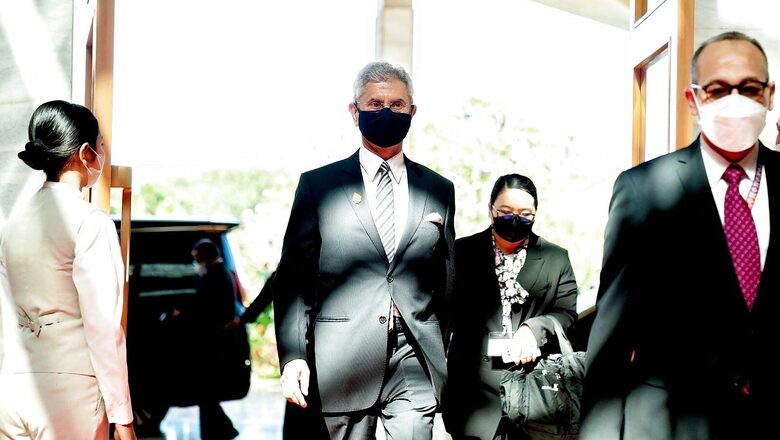
views
Russian Foreign Minister Sergei Lavrov came face-to-face with his European and American counterparts at the G20 Foreign Ministers’ Meeting (FMM) in Bali — the first time when leaders from the two opposing blocs were sharing a platform ever since the ongoing conflict in Ukraine.
The United States and most countries in Europe have been rallying in support of Ukraine ever since Russia sent in its forces in February this year. The tension was palpable as US Secretary of State Antony Blinken, with his other European allies, continued to harp on Russia’s role in the ongoing global food crisis in the wake of the Ukraine war. On the other hand, Lavrov squarely blamed the US for forcing Europe and the rest of the world to abandon cheap energy sources.
External Affairs Minister S Jaishankar also engaged with many of his counterparts in Bali on the sidelines of the FMM, starting with Chinese Foreign Minister Wang Yi, whom Jaishankar met on the first day itself. In a meeting with Yi that lasted for an hour, India called for an early resolution of all outstanding issues along the LAC in Eastern Ladakh. The minister also raised the issue of delay in starting flights and issuing visas to Indian students who wish to go back to China to complete their studies. Jaishankar stressed the need for expediting the process and facilitating the return of students on an early date.
In his meeting with his Russian counterpart, Jaishankar discussed bilateral matters and also the ongoing conflict in Ukraine. The Jaishankar-Lavrov meeting also happened in the background of Prime Minister Narendra Modi and President Vladimir Putin’s phone call a week ago in which both the leaders had talked about the state of global energy and food markets in the backdrop of the Ukraine crisis.
On the Ukraine issue, much to the dismay of the NATO allies, India has stood its ground. Despite constant nudging from the western bloc and US, India has still not condemned the Russian military action in Ukraine. While calling for cessation of all hostilities and facilitating humanitarian aid to the victims of military conflict, India has maintained that dialogue and diplomacy are the only way forward to sort out the crisis.
Jaishankar’s meeting with Blinken came on the second day of the FMM. “Continued the conversation with Secretary Blinken on global and regional issues, this time in the Bali G20 Foreign Ministers Meeting. Our relationship today allows us to approach a range of challenges with greater understanding and openness,” said Jaishankar after the meeting, while Blinken tweeted: “Met with Indian External Affairs Minister @DrSJaishankar today to discuss how we can further strengthen our bilateral partnership as well as collective efforts to address the implications of Russia’s war against Ukraine.”
Jaishankar also met the South Korean Minister of Foreign Affairs Park Jin and exchanged views on Indo-Pacific issues.
The G20 FMM consisted of two sessions. The first session was on strengthening multilateralism to strengthen global collaboration and foster mutual trust among countries, to support world stability, peace and development. The second session themed on the global Food and Energy crisis, deliberated on the strategic actions to combat food insecurity, fertilizer shortage, and rising global commodity prices. Rising commodity prices and disruption of global supply chains have enormously impacted developing countries.
The G20 grouping consists of 20 of the world’s biggest economic powers like the US, Russia, the European Union, India, Indonesia and Japan. The deliberation and policy decisions taken here have a ramification for all of the globe in areas like economy, trade, geopolitics and security. The Foreign Ministers Meeting in Bali largely happened under the shadow of Russia–Ukraine conflict and its cascading effect on food and energy security and disruption of the global supply chain.
Read all the Latest News, Breaking News, watch Top Videos and Live TV here.




















Comments
0 comment